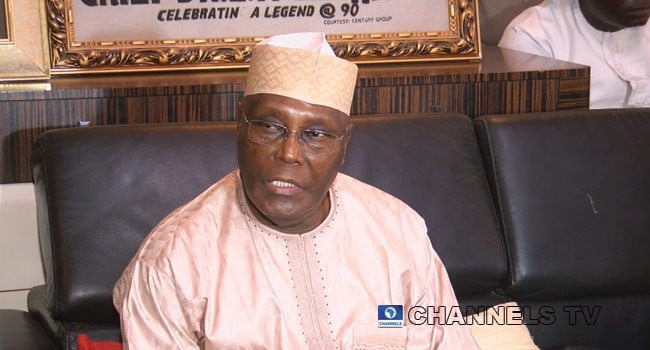Travel Ban: Atiku Gives Trump Five Reasons To Reconsider Position
The US Government had announced on Friday that citizens from Nigeria, Eritrea, Myanmar, and Kyrgyzstan won’t be allowed to apply for visas to immigrate to the U.S.
According to the country, its new policy is part of efforts to tighten security for countries that don’t comply with the U.S. minimum security standards or cooperate to prevent illegal immigration.
But Atiku took to Twitter on Saturday to express his displeasure with the situation while giving reasons why he believes the policy should be reconsidered for Nigeria.
One of such reasons is that he believes the ban does not take into account, the pro-American sentiments of the Nigerian public and the solidarity which previous Nigerian administrations have had with the United States.
He also asked the Trump administration to consider the pivotal role that Nigeria, in partnership with the US, played in bringing peace to Liberia – an American sphere of influence,that now enjoys democracy because “Nigerian blood and money paved the way for peace in that nation”.
A third reason according to Atiku is that Nigeria is one of the biggest trading partners of the US.
He also says Nigeria has consistently voted in support of the United States and her allies at the United Nations and other multi-lateral world bodies.
Finally, he believes that placing a ban on the entire country, rather than dealing precisely with specific elements in government which he says are to blame for the nation’s inefficiencies, is unfair.
The current Nigerian administration may have its deficiencies and deep faults, but the Nigeria people ought not to be punished for their inefficiencies,” Atiku said.
“Once again, I call on President Trump to consider adopting measures that individually target those in government who have failed in their duties, rather than target the entire Nigerian population”.
Read Atiku’s Full Statement Below.
US Travel Ban on Nigeria: Punish Those Responsible, Not the Nigerian People
I received with sadness the policy of the government of the United States of America to place Nigeria on its travel ban list.
While I understand the reasons given by the Trump administration (the failure of the Muhammadu Buhari led administration to share information and to address issues of terrorism), the ban does not take into account the pro-American sentiments of the Nigerian public and the solidarity previous Nigerian administrations have had with the United States.
I urge the government of President Donald Trump to consider the history of US-Nigerian relationships. Nigeria was one of the few African nations that joined the US led coalition during Operation Desert Storm in 1990-1991, when the United States championed the liberation of Kuwait.
The Trump administration may also consider the pivotal role Nigeria, in partnership with the US, played in bringing peace to Liberia, an American sphere of influence, that now enjoys democracy because Nigerian blood and money paved the way for peace in that nation.
Nigeria has also consistently voted in support of the United States and her allies at the United Nations and other multi-lateral world bodies. This is even as we are perhaps the biggest trading partner that the United States has in Africa, even where we had alternatives.
Nigerians love the United States and have been a major force for the positive development of that great nation: 77 per cent of all Black doctors in the United States are Nigerians. Nigerians are also the most educated immigrant community in America Bar None.
Surely, the US stands to benefit if it allows open borders with a country like Nigeria that is able to provide skilled, hardworking and dedicated personnel in a two-way traffic.
The current Nigerian administration may have its deficiencies and deep faults, but the Nigeria people ought not to be punished for their inefficiencies.
Once again, I call on President Trump to consider adopting measures that individually target those in government who have failed in their duties, rather than target the entire Nigerian population.



